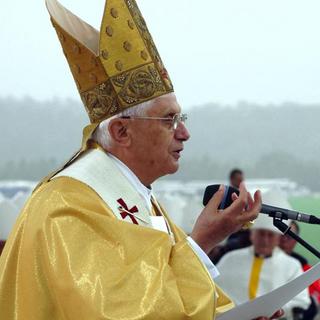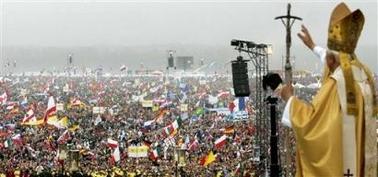Christ, adoration, and union
 "We are to become the Body of Christ, his own flesh and blood. We all eat the one bread, and this means that we ourselves become one.
"We are to become the Body of Christ, his own flesh and blood. We all eat the one bread, and this means that we ourselves become one."In this way, adoration, as we said earlier, becomes union. God no longer simply stands before us, as the one who is totally Other. He is within us, and we are in him. His dynamic enters into us and then seeks to spread outwards to others until it fills the world, so that his love can truly become the dominant measure of the world.
"I like to illustrate this new step urged upon us by the Last Supper by drawing out the different nuances of the word 'adoration' in Greek and in Latin.
"The Greek word is proskynesis.
 "It refers to the gesture of submission, the recognition of God as our true measure, supplying the norm that we choose to follow. It means that freedom is not simply about enjoying life in total autonomy, but rather about living by the measure of truth and goodness, so that we ourselves can become true and good. This gesture is necessary even if initially our yearning for freedom makes us inclined to resist it. We can only fully accept it when we take the second step that the Last Supper proposes to us.
"It refers to the gesture of submission, the recognition of God as our true measure, supplying the norm that we choose to follow. It means that freedom is not simply about enjoying life in total autonomy, but rather about living by the measure of truth and goodness, so that we ourselves can become true and good. This gesture is necessary even if initially our yearning for freedom makes us inclined to resist it. We can only fully accept it when we take the second step that the Last Supper proposes to us."The Latin word for adoration is ad-oratio – mouth to mouth contact, a kiss, an embrace, and hence ultimately love.
"Submission becomes union, because he to whom we submit is Love. In this way submission acquires a meaning, because it does not impose anything on us from the outside, but liberates us deep within.
"Let us return once more to the Last Supper. The new element to emerge here was the deeper meaning given to Israel’s ancient prayer of blessing, which from that point on became the word of transformation, enabling us to participate in the 'hour' of Christ.
"Jesus did not instruct us to repeat the Passover meal, which in any event, given that it is an anniversary, is not repeatable at will. He instructed us to enter into his 'hour.' We enter into it through the sacred power of the words of consecration – a transformation brought about through the prayer of praise which places us in continuity with Israel and the whole of salvation history, and at the same time ushers in the new, to which the older prayer at its deepest level was pointing. The new prayer – which the Church calls the 'Eucharistic Prayer' – brings the Eucharist into being. It is the word of power which transforms the gifts of the earth in an entirely new way into God’s gift of himself and it draws us into this process of transformation.
"That is why we call this action 'Eucharist,' which is a translation of the Hebrew word beracha – thanksgiving, praise, blessing, and a transformation worked by the Lord: the presence of his 'hour.'
"Jesus’s hour is the hour in which love triumphs. In other words: it is God who has triumphed, because he is Love."
 (from Pope Benedict's homily at World Youth Day yesterday)
(from Pope Benedict's homily at World Youth Day yesterday)
 A Penitent Blogger
A Penitent Blogger

<< Home